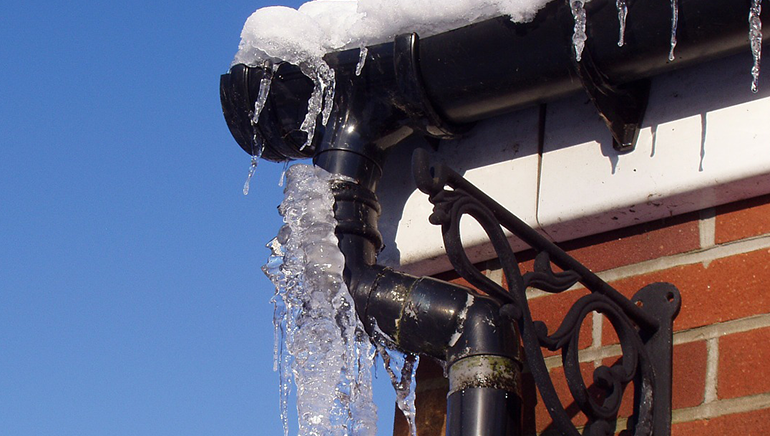
If you’re going south for the winter, you don’t want to come home to a plumbing disaster. Before you head out of town, make sure your house is prepared to withstand the cold temperatures while you’re gone.
Prevent Your Pipes From Freezing
Frozen Pipes
Before explaining how to prevent your pipes from freezing, we should address how, exactly, pipes can freeze in the first place. Pipes can freeze under three conditions: if a home is poorly insulated, if the heat is turned off or set too low during the winter, or if outdoor temperatures take a sudden dip.
Under these circumstances, once the water inside your pipes begins to freeze, your pipes become susceptible to bursting as well. Water expands when it turns into ice and takes up more room inside a pipe. This can cause a pipe to burst; however, pipes usually burst as a result of backed up water pressure behind a blockage (ice) inside the pipe.
Bursting Pipes
If water gets trapped behind ice inside a pipe, the pressure will begin to build as the water attempts to flow to where it needs to go. When this pressure becomes too much for the pipe to handle, it can crack. Even a tiny crack in a pipe can create a lot of water damage in your home.
To avoid this from happening, you need to make sure your pipes are kept warm enough. Insulating your pipes with sleeves or heat tape may be a prudent idea, particularly the pipes located near exterior walls or non-insulated parts of your home. This might include your attic, basement, garage, or a crawl space. You can also add insulation to cold, drafty parts of your home to create a tighter seal and increase your home's overall energy efficiency.
Check Your Gutters
Make sure your gutters are clear before you leave for vacation. If too much water pools and freezes inside your gutters because sticks and leaves are wedged inside, the weight can eventually cause breakage. If your gutters break off of your home, your roof, siding, and foundation will be left vulnerable to possible water damage. Also check downspouts to make sure they’re positioned correctly to discharge water at least 10 feet away from your home’s foundation.
Disconnect Your Hoses
Do you still have a hose sitting in your yard that you forgot to store safely away inside your garage for the winter? Now is better than never! If water is trapped inside and freezes, it can ruin your hose, causing it to crack and burst. Frozen water inside a hose also has the potential to crack the faucet it's connected to and damage your plumbing system.
Disconnect any garden hoses, and shut off the water supply to exterior faucets before you leave your home. Once the supply is shut off, drain any remaining water from pipes by opening outdoor faucets.
Other Tips to Protect Your Pipes
- Don’t set your thermostat lower than 55°F in the winter, even if you leave for a long vacation!
- Never turn your heat off completely when you leave home.
- Open cupboard doors in your kitchen and bathrooms to let warm air reach pipes in these areas.
- Either let one faucet slowly drip continuously when you’re away (to relieve any pressure buildup inside pipes) or turn off your water supply completely and drain pipes before you leave.
To learn more about keeping your home safe this winter, subscribe to our blog.
